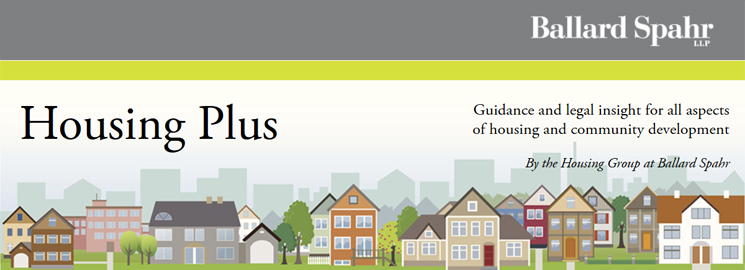
At yesterday’s Housing Authority Summit, representatives from housing authorities, HUD’s Office of Public Housing Investments and RAD teams, housing legislative advocates, key industry financial and advisory consultants and members of Ballard Spahr’s Housing Group gathered for a day of informative and engaging dialogue around key issues impacting housing authorities. Some things heard at the Summit included:
-
One RAD fact - 81 RAD transactions have closed thus far involving 7,500 units and the financing of $300 million in hard cost construction/renovation.
-
In a series of round table discussions about housing authority affiliates and instrumentalities, we discussed entrepreneurial activities, and learned (or were reminded!) to think about the following:
-does your state enabling legislation permit the activity?
-do you need to enter into an intergovernmental agreement?
-do you need a shared services agreement with the parent housing authority?
-if you are trying to help an instrumentality serve as a guarantor, it will need to have separate, nonfederal assets, and may need three years of audited financial statements
-don’t forget to do state and federal filings for each affiliate and instrumentality
-do open meetings act rules apply? Different states have different rules.
-
Complex property management issues arise when it comes to medical marijuana and recreational marijuana use permitted by recent changes in various state laws
-
HUD recognizes the tension between the need to preserve public housing while providing housing authorities access to the value in its portfolio in order to best address ongoing needs and is eager to hear from the public housing community regarding the proposed revisions to the demolition/disposition rule and is hoping to receive feedback through the comment period ending December 15.
-
The Municipal Advisors Rule and the Municipalities Continuing Disclosure Cooperation Initiative are real considerations for housing authorities.
-
Also on the RAD front – HUD reminded the group that there should be no relocation of residents from a RAD site to ready the site for rehab until the RAD closing occurs unless HUD waives the requirement for good cause.
-
HUD has issued the last round of conditional CHAPs for those above the 60,000 cap and predictions vary widely as to whether Congress will lift the cap, ranging from an increase to between 100,000 and 185,000.
-
At another round table discussion, we learned about an approach to regulatory waivers being developed to provide housing authorities with flexibility outside of the Moving to Work context.
-
Housing authorities always face challenges to develop housing and provide opportunities for the families in their communities striving to build upon the stability provided by that housing, but the level of dedication to enhancing those opportunities is not waning.
We look forward to learning more today at the Housing Symposium, the second day of Ballard Spahr’s annual National Housing Conference.